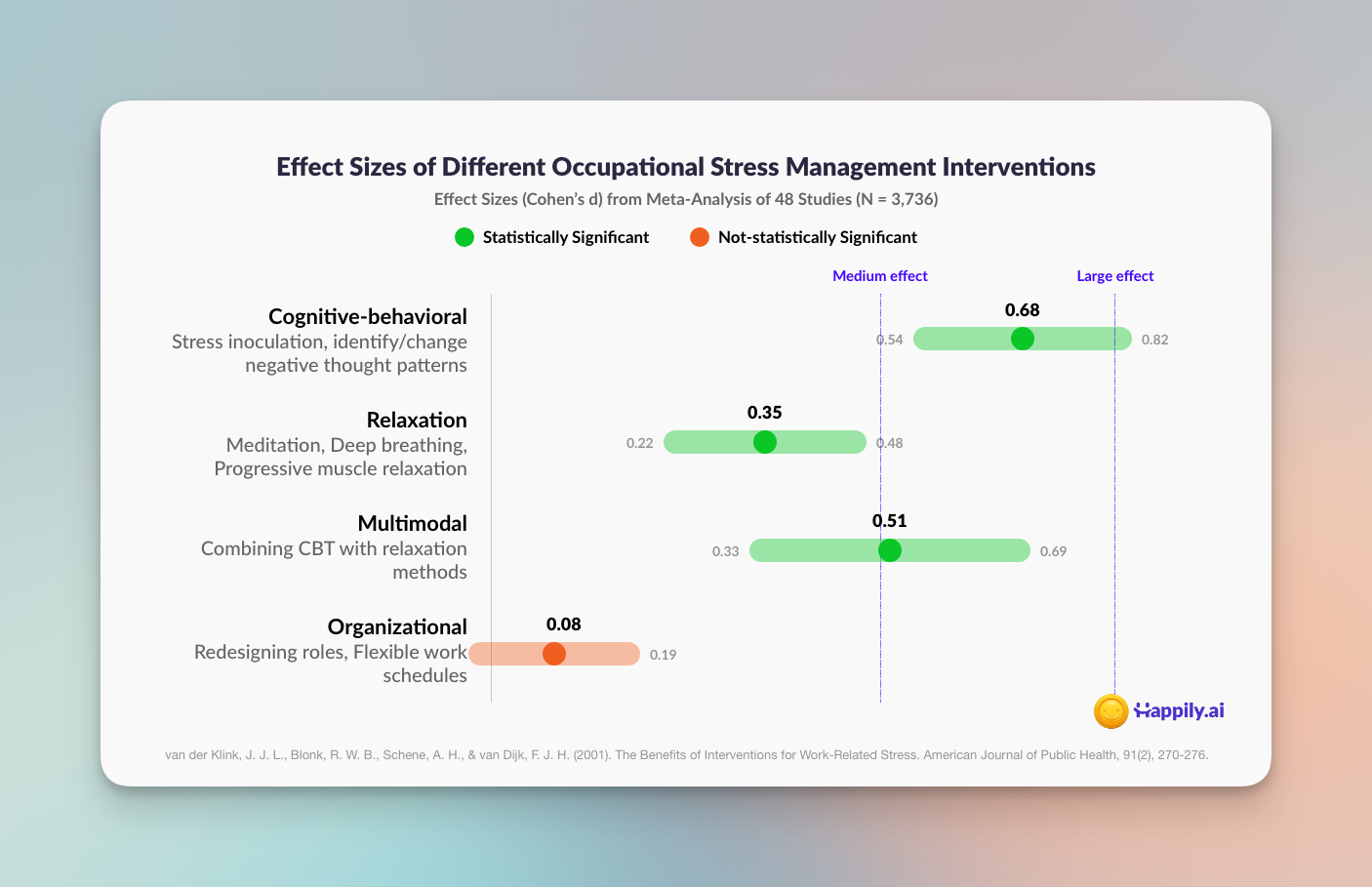New Research Reveals Surprising Insights on Effective Stress Reduction Techniques
Workplace stress remains a significant challenge for organizations worldwide, impacting both employee well-being and business productivity. A groundbreaking meta-analysis of 48 studies involving over 3,700 workers has provided crucial insights into the most effective strategies for managing occupational stress. This research offers valuable guidance for HR professionals and executives seeking to develop more impactful well-being initiatives.

The Dominance of Cognitive-Behavioral Interventions
The meta-analysis revealed that cognitive-behavioral interventions are the most effective approach to stress management, boasting an impressive effect size of 0.68. As the study authors note, "Cognitive–behavioral interventions are more effective than the other intervention types." These approaches aim at "changing cognitions and subsequently reinforcing active coping skills."
Cognitive-behavioral interventions essentially focus on altering how employees perceive and respond to workplace challenges. For instance, an employee feeling overwhelmed by a project deadline might be guided to reframe their thinking from "I'll never get this done" to "I can break this into smaller, manageable steps." This shift in perspective can significantly reduce stress levels and enhance problem-solving capabilities.
The Complementary Role of Relaxation Techniques
While not as impactful as cognitive-behavioral methods, relaxation techniques still showed a significant positive effect (0.35) on stress reduction. The meta-analysis found that these techniques, which "focus on physical or mental relaxation as a method to cope with the consequences of stress," provide valuable tools for managing acute stress responses. Examples include meditation, deep breathing exercises, and progressive muscle relaxation.
The Unexpected Ineffectiveness of Organizational Interventions
One of the most surprising findings from the meta-analysis was the minimal impact of organizational-level interventions, such as job redesigns and flexible work schedules. These approaches showed no significant benefits in reducing employee stress, with a mere 0.08 effect size.
The study authors suggest this might be because "individual-level outcomes with this kind of intervention depend on an intermediate effect" and "it may take time to produce measurable effects at the individual level." This revelation challenges the conventional wisdom that structural changes are the primary solution to workplace stress.
The Quality Over Quantity Principle
Another key insight from the research is the superior effectiveness of shorter, focused interventions compared to longer, more infrequent programs. This finding suggests that consistent, bite-sized learning opportunities might yield better results in stress management than traditional, lengthy workshops.
Implementing Evidence-Based Stress Management Strategies
Based on these research findings, organizations can take several steps to enhance their stress management initiatives:
- Introduce Cognitive Reframing Workshops: Develop a series of short, focused sessions that teach employees to identify stress triggers and reframe their thoughts about these situations.
- Integrate Daily Mindfulness Practices: Incorporate brief relaxation exercises into the workday, such as guided meditation sessions or breathing exercises during breaks.
- Train Managers in Supportive Coaching: Equip team leaders with skills to help their reports develop more constructive perspectives on workplace challenges.
- Create a Digital Stress Management Toolkit: Offer employees access to on-demand resources for stress management, including short video tutorials, interactive exercises, and mobile apps focused on cognitive reframing and relaxation techniques.
- Regular Stress Check-ins: Implement periodic, brief assessments to gauge employee stress levels and the effectiveness of interventions, allowing for continuous improvement of stress management strategies.
The Role of Technology: Happily.ai
As organizations seek to implement these evidence-based strategies, technology is emerging as a crucial enabler. AI-powered platforms, like Happily.ai, can deliver personalized, just-in-time interventions that align with the research findings on effective stress management.
Conclusion
Workplace stress management is an essential skill, and new research points to the superiority of cognitive-behavioral approaches and consistent, bite-sized interventions.
By leveraging tech to deliver timely interventions, companies can effectively implement the stress management strategies proven to work best, fostering a more resilient and engaged workforce. Happily.ai's approach to continuous, personalized interventions mirrors the research findings on the effectiveness of consistent, focused stress management techniques. To explore how Happily.ai can transform your organization's approach to stress management and employee well-being, visit happily.ai.









